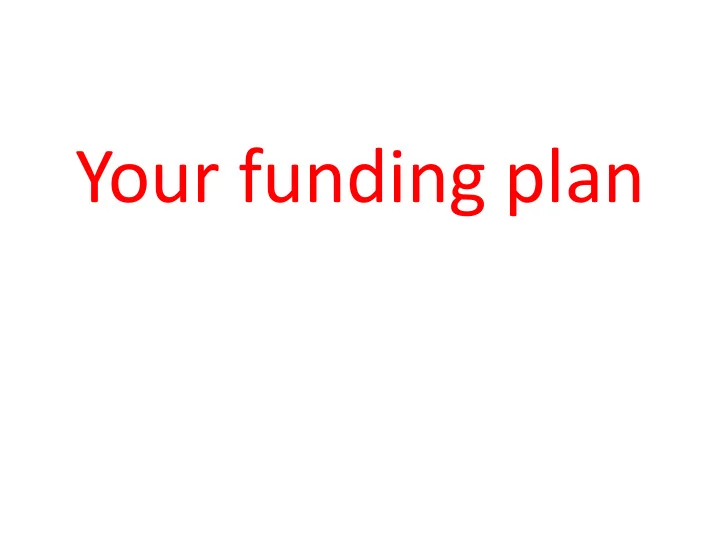

Your funding plan
Your fundraising plan
Why bother?
Actually … • Less than 17,000 Charities (71%) reported any level of fundraising income • Less than 10,000 Charities (43%) raised more than $10,000 • 3,200 Charities (13.9%) raised more than $100,000 • 392 Charities (1.7%) raised more than $1m But those Charities raised more than $2.5 billion in 2014
So, what is it you are planning for? 1. Just to raise more money 2. So we can engage people 3. To pay for the costs of delivering our services 4. To provide a means for people to support our cause in ways that really change things 5. To cover the costs of running our organisation 6. To give expression to people’s expectations and passions
So, what is it you are planning for? • Just to raise more money • So we can engage people • To pay for the costs of delivering our services • To provide a means for people to support our cause in ways that really change things • To cover the costs of running our organisation • To give expression to people’s expectations and passions
Transactional Fundraising Event Selling attendance merchandise Ticket sales Selling Lottery and merchandise Raffle sales
Rules of transactional fundraising Selling – the right idea/event/product – to the right person – in the right way – at the right time – at the right price
How about fundraising for these reasons? • Just to raise more money • So we can engage people • To pay for the costs of delivering our services • To provide a means for people to support our cause in ways that really change things • To cover the costs of running our organisation • To give expression to people’s expectations and passions
Transformational fundraising Change the world Make it Prevent it better from for happening someone
A few key principles (for transactional fundraising) • You’re selling something – make sure it’s fit for sale and will deliver what’s expected/ promised • People are buying something – whose receiving the proceeds is secondary • It’s a business transaction – organise it and treat it as one.
A few key principles (for transformational fundraising) • Open their hearts, then open their minds, then open their cheque-books • If you want someone’s opinion, ask them for money; if you want their money, ask them for their opinion • If you want become good at this, become an excellent story-teller.
So, what is it we’re planning? • Define your purpose/need – Sensible but not inspirational? Keep trying or stick to transactional fundraising activity • Define why ‘your organisation’ – Justify why it should not be any of the other 27,000 • Demonstrate value – Describe what a difference is going to be made/how the money is to be spent
Identify your expertise • What are you capable of organising (and repeating)? – Effectiveness first and efficiency thereafter • What do you have the resources for – Determine the size of the activity you can sustain • What’s your market reach? – Who is going to buy and how do you communicate with them to sell?
Can you access expertise? • Event/activity planning • Event organisation • Third-party organisation • Direct marketing and PR supply • Production and logistics supply • Market analysis • Bookings • Banking • Reporting
Choose your fundraising options • Short-term – Events – Merchandising – Grant-seeking • Medium-term – Donor development – Sponsorship – Capital fundraising campaigns • Long-term – Bequests – Endowment
So, plan • For every element of fundraising develop a description of – Why - what’s the rationale and intended outcome – What - a description of the activity, size and elements – How - both organisation and market reach/response – Where - the logistics of organising – When - timetable – By whom - key players and responsibilities – In case - contingency and risk avoidance plans – So that - accountability and celebration plans for success
Available resource assistance
Your plan should include… • Your annual fundraising plan should include all of the relevant elements that – makes provision for short-term, medium-term and long-term growth – is within the current resourcing capabilities of your organisation – balances short-term need with longer-term investment needs
Questions?
Recommend
More recommend